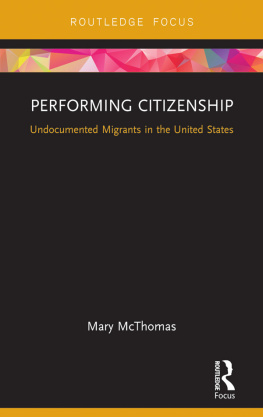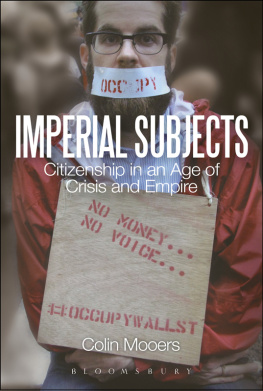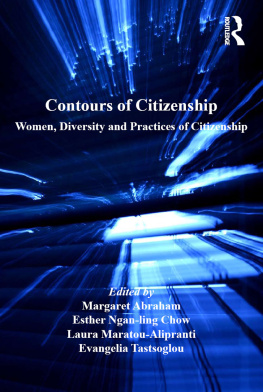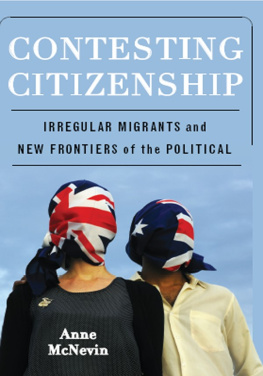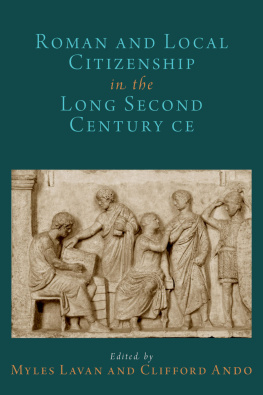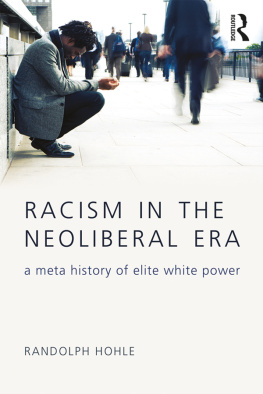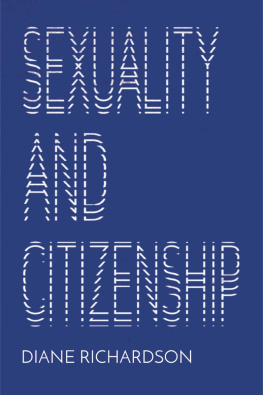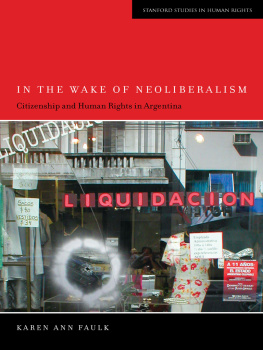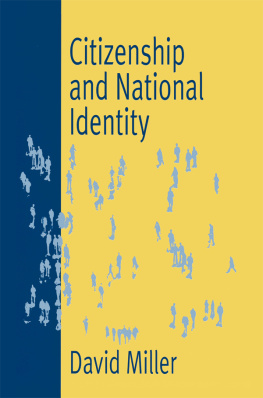Economic Citizenship
Economic Citizenship
Neoliberal Paradoxes of Empowerment
Amalia Saar
Published in 2016 by
Berghahn Books
www.berghahnbooks.com
2016 Amalia Saar
All rights reserved. Except for the quotation of short passages for the purposes of criticism and review, no part of this book may be reproduced in any form or by any means, electronic or mechanical, including photocopying, recording, or any information storage and retrieval system now known or to be invented, without written permission of the publisher.
Library of Congress Cataloging-in-Publication Data
Names: Saar, Amalia, author.
Title: Economic citizenship : neoliberal paradoxes of empowerment / Amalia Saar.
Description: New York : Berghahn Books, 2016. | Includes bibliographical references and index.
Identifiers: LCCN 2015047970| ISBN 9781785331794 (hardback : alk. paper) | ISBN 9781785331800 (ebook)
Subjects: LCSH: WomenIsraelSocial conditions. | WomenIsraelEconomic conditions. | WomenEmploymentIsrael. | Poor womenIsraelSocial conditions. | DiscriminationIsrael. | InequalityIsrael. | CitizenshipIsrael.
Classification: LCC HQ1728.5 .S23 2016 | DDC 305.4095694dc23
LC record available at hkp://lccn.loc.gov/2015047970
British Library Cataloguing in Publication Data
A catalogue record for this book is available from the British Library
ISBN 978-1-78533-179-4 hardback
ISBN 978-1-78533-180-0 ebook
In memory of my sister
Avi Dror-Sircovich.
Contents
List of Tables
Selected data on social inequalities in Israel
Incidence of poverty among families by population groups (percentages)
Wage gaps in Israel, by ethnonationality and gender, 2012 (in Israeli New Shekel)
Arabs aged 15 and over, by labor force characteristics, sex, and selected characteristics, 2013
Single mothersselected data
List of Abbreviations and Research Projects
Abbreviations
BONPO business-organized nonprofit organization
CED community economic development
EEW Economic Empowerment for Women (name of organization)
GONGO government-organized nongovernmental organization
Histadrut General Union of Hebrew Workers in the Land of Israel
JDC Joint Distribution Committee
MITL Ministry of Industry, Trade, and Labor
MATI (merkaz tipuah yazamut) State-sponsored centers for fostering entrepreneurship
NGO nongovernmental organization
NII National Insurance Agency (central state agency responsible for all social benefits)
NPO nonprofit organization
OECD Organization for Economic Co-operation and Development
Research Projects
al-Tufula (Arabic, childhood) Center
Atida project
Bedouin Village Study (focused on the Sawa Empowerment Project)
Mahut Center
Microentrepreneurship Study
Van Leer Research Group Survey
Acknowledgments
It is with great pleasure that I acknowledge the many people and institutions who have supported me and contributed to the research and writing of this book.
During several periods of fieldwork, spanning more than a decade, I met and became friends with many incredible women, and some men, Palestinian and Jewish, whose struggles to live full, dignified lives filled me with awe and inspiration, and whose kindness and generosity in letting me into their lives continue to imbue me with gratitude and humility. These women are not mentioned here by name because I am committed to protect their privacy. I hope that those of them who read the book will feel that I have communicated their perspectives with fairness and respect, although, of course, the presentation and interpretations are solely my responsibility.
I was blessed with numerous talented assistants who took part in various stages of the research. Most of them were my graduate students; some even wrote their MA theses on specific topics within the larger frame of the research. I thank Chava Nishri, Chava Rubin, Tamar Kaneh-Shalit, Yaara Buksbaum, Itay Alter, Guy Bruker, Nisreen Mazzawi, Adi Romano, Yevgenia Gorbachevich, Maayan Agmon, Yael Shostak-Pascal, Noor Falah, Kifah Daghash, and Samiyya Sharkawi for conducting sensitive interviews, collecting archival and public materials, coding and analyzing, and helping me think through the many paradoxes that emerged with the unfolding of the research.
A wonderful reward of working on this book was the opportunity to forge intellectual partnerships with other feminist colleagues who, like me, have been fascinated by the effects of the neoliberal turn on Israeli civil society, and by the penetration of the ideology of self-governmentality into feminist and human rights circles. I am grateful to Nitza Berkovitch, Adriana Kemp, and Mimi Ajzenstadt for inviting me to the Van Leer research group on the NGOization of civil spaces and for the opportunity to converse in a common theoretical language. Additional critical sustenance came from friends and colleagues in the field itself, who were a constant source of ideological and intellectual innovation. I thank Ruti Gur, Khawla Reihani, Michal Dagan, Nabila Espanioly, and Johayna Hussain for allowing me a close look at the wonderful work they have been doing, and my many friends at Isha-L-Isha, the Haifa Feminist Center, which has been my political home for so many years and which has served as a springboard for important feminist empowerment initiatives. I thank and acknowledge, with love, Ayelet Ilany for her wisdom and insights, for teaching me so much that I did not know, and for inspiring me with her capacity to imagine and fight for a better society, while keeping her heart open to human injustices and human beauty.
I wrote the book in Boston, during my sabbatical year at the Department of Anthropology at Boston University. I thank Rob Weller for offering me the affiliation and for his kind and warm hospitality. My gratitude to Chuck Lindholm, also from Boston University, dates long before this book, whose progress he accompanied with careful reading and thoughtful comments. As my former dissertation adviser, Chuck has been a true teacher, setting a very high intellectual standard combined with an open mind and a good sense of humor. Diana Wylie read and commented on the entire manuscript and contributed to making my year in Boston a nourishing writing period by engaging me in stimulating intellectual conversation along with wonderful social and cultural recreation. I thank Val Moghadam, whose rich feminist scholarship on women in the Middle East and North Africa has been a major analytical reference point for me, for her warm, generous friendship during my stay in Boston and for her attentive reading of some of the chapters of this book. Other colleagues who enriched and supported me during the writing period away from home were Michal Frenkel, Alanna Cooper, Joyce Dalsheim, Pnina Lahav, Shahla Haeri, and Paula Rayman, and of course my beloved aunt and cousins Lea (Loly), Tammy, Marc, and Daniel Kamionkowski.
In Israel, I thank my colleagues at the University of Haifa Department of Anthropology and surrounding departments, Tamar Katriel, Carol Kidron, Nurit Bird-David, Yuval Yonay, Debbie Bernstain, Dalit Simchai, Alisa Lewin, Tally Katz-Gerro, Asaf Darr, Rebeca Raijman, and Regev Nathanson, for providing a sound intellectual environment for debate and discussion. Particular thanks go to Tsipy Ivry, whose feminist anthropological outlook converges so perfectly with mine and who therefore has been among the most immediate partners for sharing ideas, dilemmas, frustrations, and revelations.


